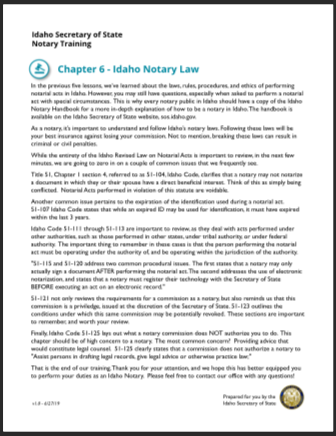Idaho Secretary of State
Notary Training
![]()
Training Video
Training Transcript
 Chapter 6 – Idaho Notary Law
Chapter 6 – Idaho Notary Law
In the previous five lessons, we’ve learned about the laws, rules, procedures, and ethics of performing notarial acts in Idaho. However, you may still have questions, especially when asked to perform a notarial act with special circumstances. This is why every notary public in Idaho should have a copy of the Idaho Notary Handbook for a more in-depth explanation of how to be a notary in Idaho. The handbook is available on the Idaho Secretary of State website, sos.idaho.gov.
As a notary, it’s important to understand and follow Idaho’s notary laws. Following these laws will be your best insurance against losing your commission. Not to mention, breaking these laws can result in criminal or civil penalties. While the entirety of the Idaho Revised Law on Notarial Acts is important to review, in the next few minutes, we are going to zero in on a couple of common issues that we frequently see.
Title 51, Chapter 1 section 4, referred to as 51-104, Idaho Code, clarifies that a notary may not notarize a document in which they or their spouse have a direct beneficial interest. Think of this as simply being conflicted. Notarial Acts performed in violation of this statute are voidable. Another common issue pertains to the expiration of the identification used during a notarial act.
51-107 Idaho Code states that while an expired ID may be used for identification, it must have expired within the last 3 years. Idaho Code
51-111 through 51-113 are important to review, as they deal with acts performed under other authorities, such as those performed in other states, under tribal authority, or under federal authority. The important thing to remember in these cases is that the person performing the notarial act must be operating under the authority of, and be operating within the jurisdiction of the authority.
51-115 and 51-120 address two common procedural issues. The first states that a notary may only actually sign a document AFTER performing the notarial act. The second addresses the use of electronic notarization, and states that a notary must register their technology with the Secretary of State BEFORE executing an act on an electronic record.”
51-121 not only reviews the requirements for a commission as a notary, but also reminds us that this commission is a privilege, issued at the discretion of the Secretary of State.
51-123 outlines the conditions under which this same commission may be potentially revoked. These sections are important to remember, and worth your review.
Finally, Idaho Code 51-125 lays out what a notary commission does NOT authorize you to do. This chapter should be of high concern to a notary. The most common concern? Providing advice that would constitute legal counsel. 51-125 clearly states that a commission does not authorize a notary to “Assist persons in drafting legal records, give legal advice or otherwise practice law;”
So on to your final quiz, and then that is the end of our training. Thank you for your attention, and we hope this has better equipped you to perform your duties as an Idaho Notary. Please feel free to contact our office with any questions!
An Idaho notary public is a public official commissioned by the Idaho Secretary of State. They administer oaths and affirmations, take acknowledgements, witness signatures, and perform other duties as permitted by state law. A notary should pay close attention to the details, because as a commissioned public official, notaries ARE acting on behalf of the state of Idaho. We thank you for taking on this responsibility, and hope this quick journey through the Notary handbook gives you a good start.
The notary’s primary function is to serve as an official, unbiased witness to the identity, the comprehension, and the intent of the person requesting the notarial act. This is why the person whose signature, oath, or acknowledgement you are notarizing MUST personally appear before you when you perform the notarization. When performing any notarial act, it is important to understand how the act affects the rights of others. Carelessness or negligence when performing a notarial act may injure these rights which can result in the notary being held personally responsible for improper, negligent, or fraudulent actions.
As an official witness who has been appointed by the Idaho Secretary of State, a notary must act with integrity and impartiality. It is important to remember that every notarial act is performed under the notary’s oath of office. This is the reason for the statement printed on every notarial certificate. These words are not mere formalities; they are the notary’s “witness statement” telling what happened, where it happened, when it happened, and who was involved.
Finally, to help offset your costs incurred as a notary, Idaho statutes allow you to charge a maximum fee of $5 for performing a notarial act. You can also charge for reasonable travel expenses. So with that quick overview, lets return to the course and take your first quiz!
v1.0 – 6/27/19


